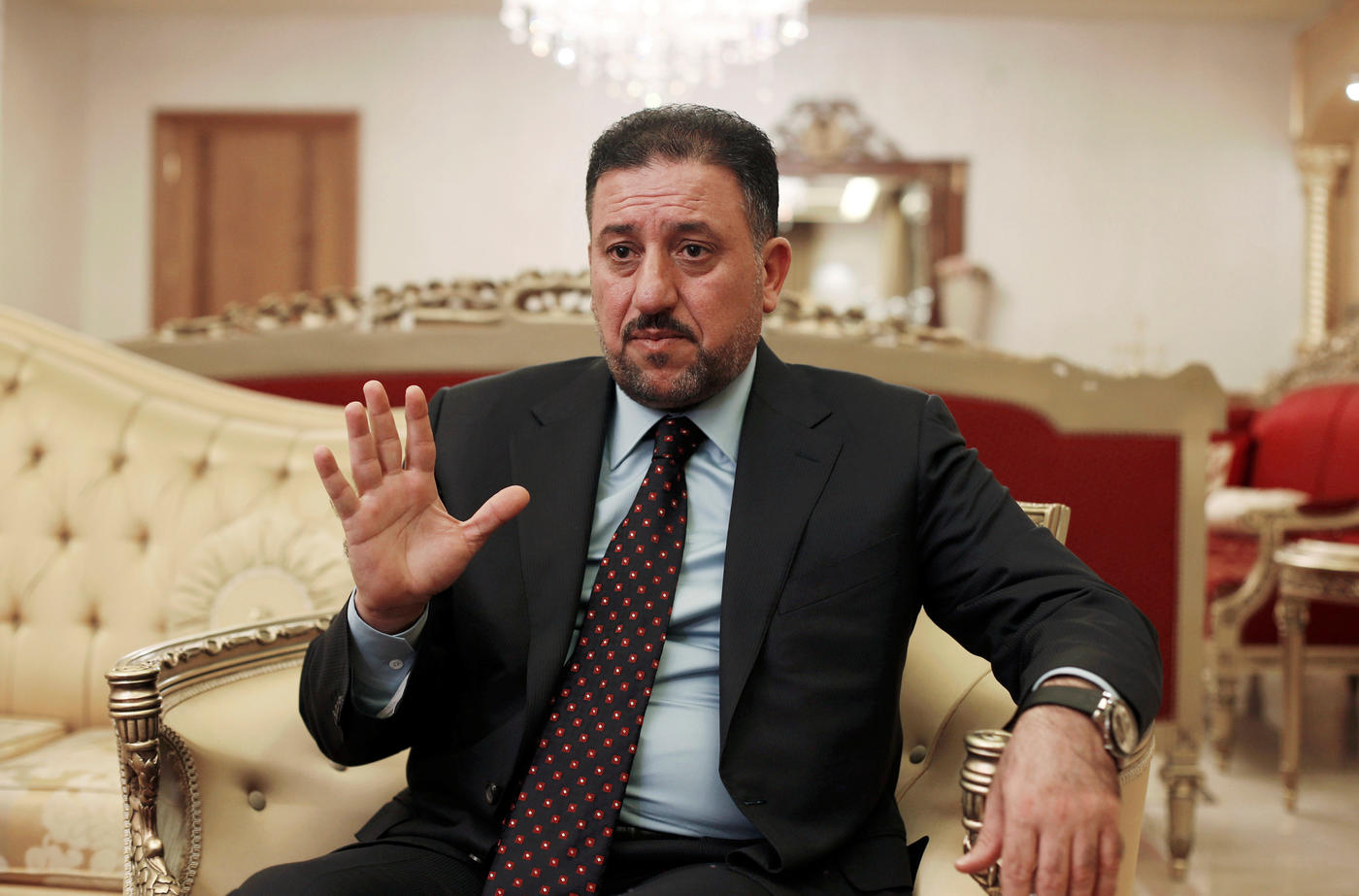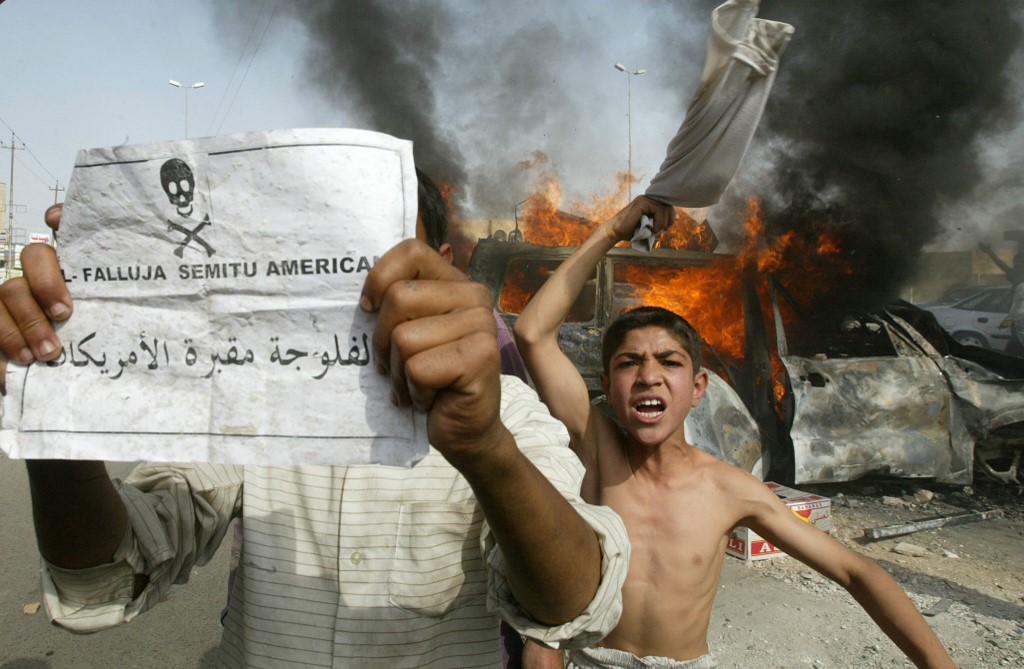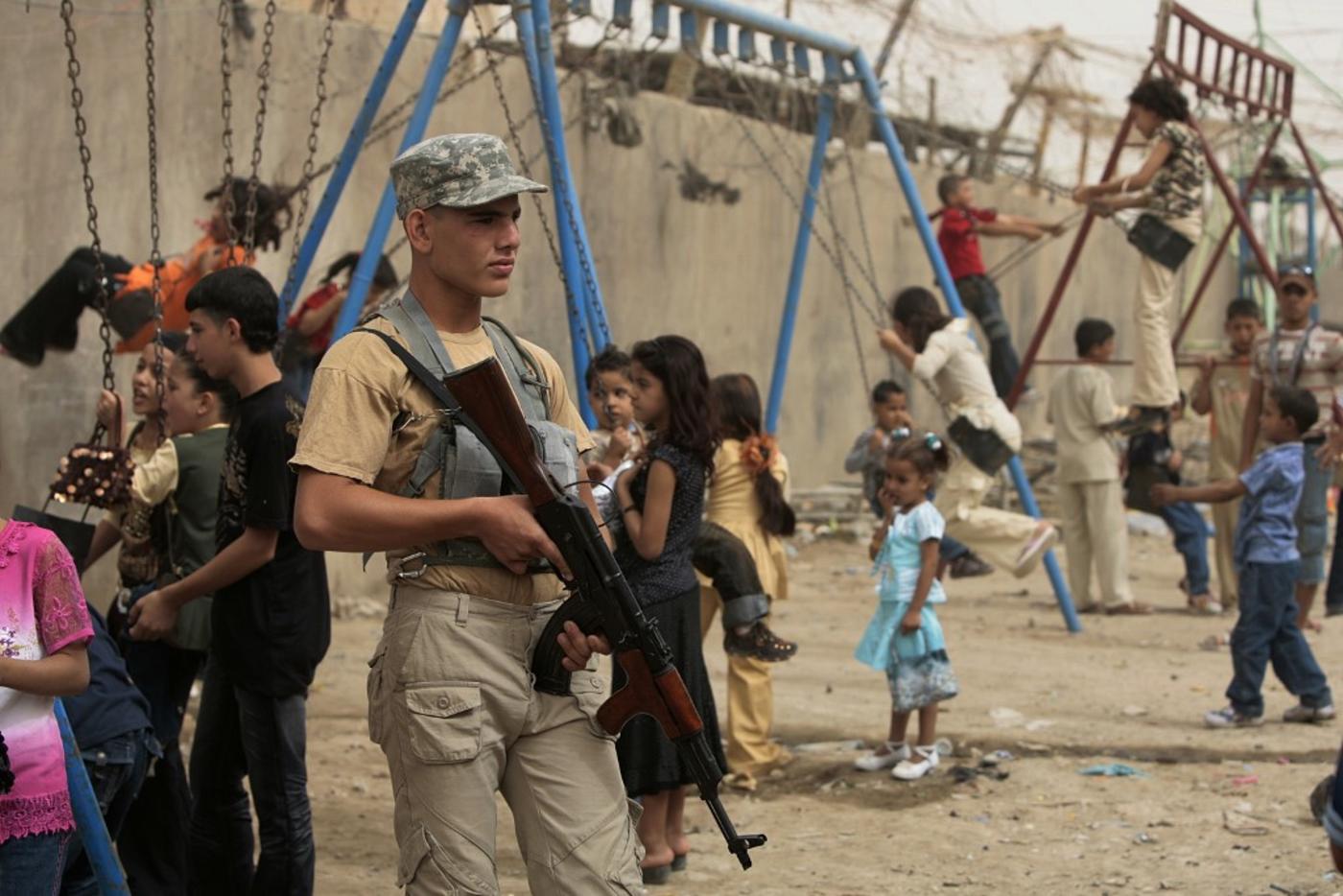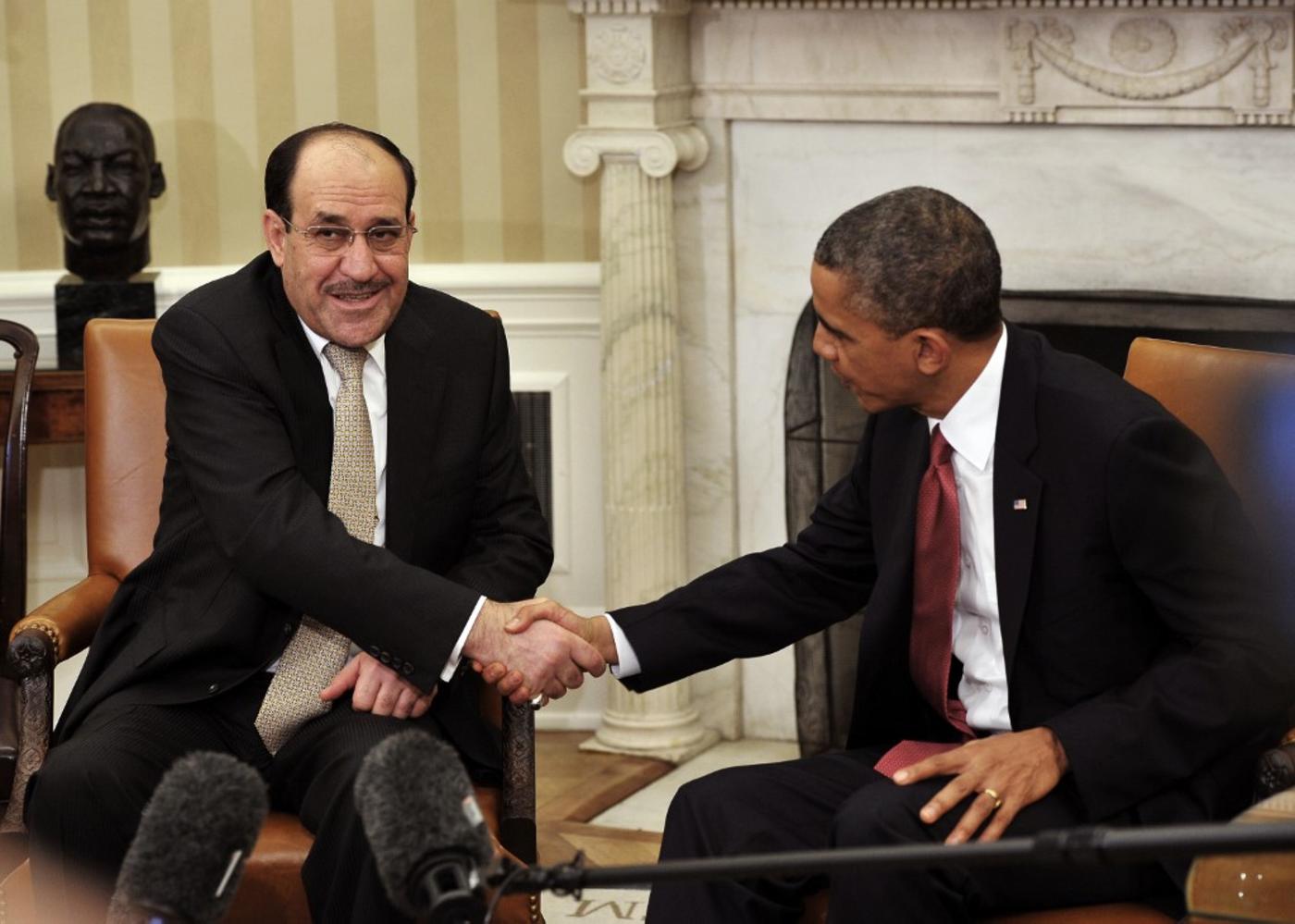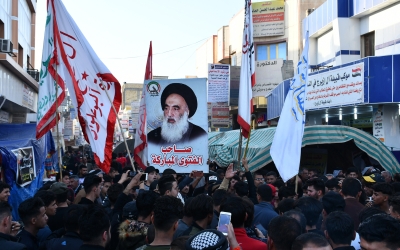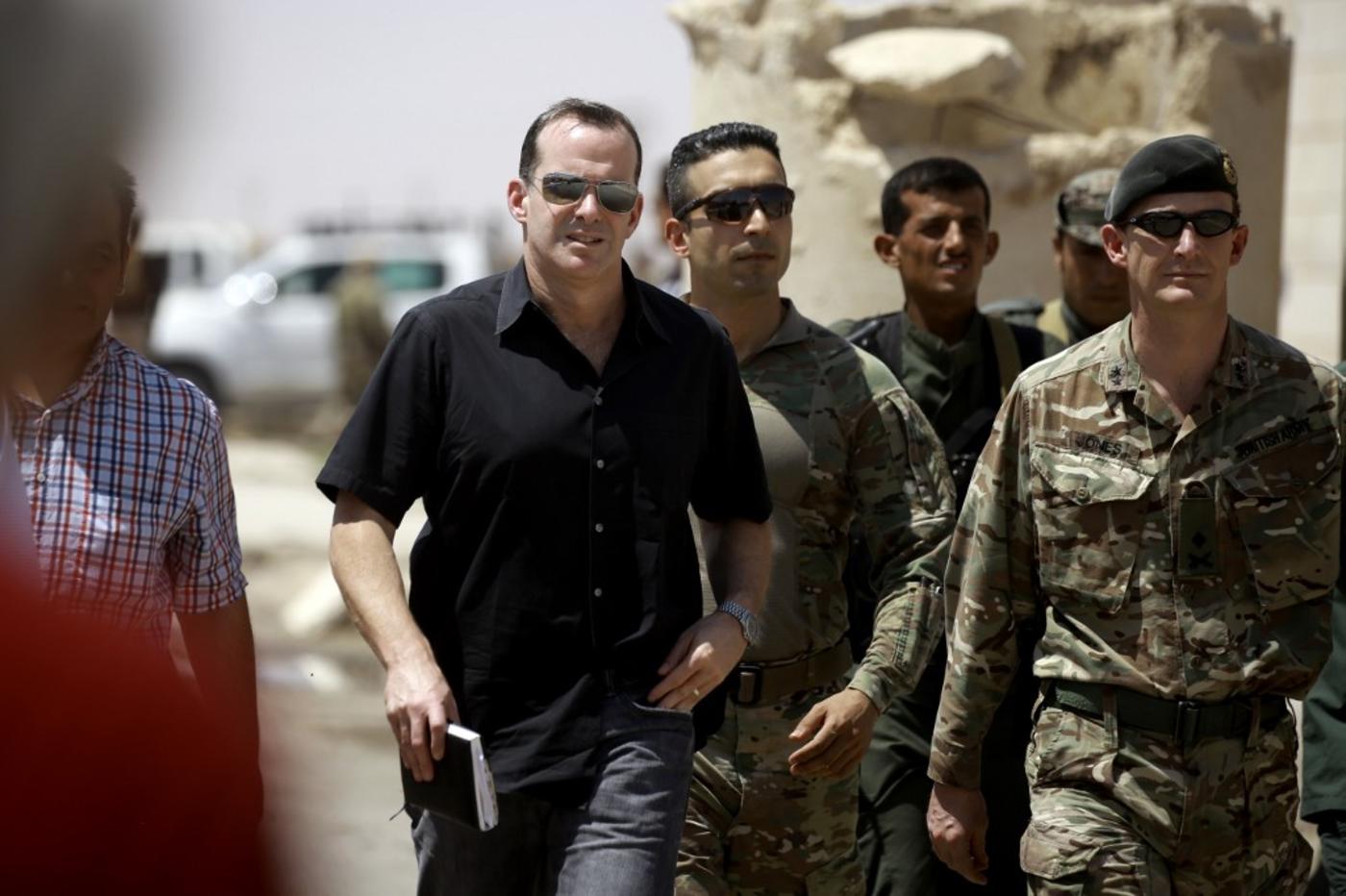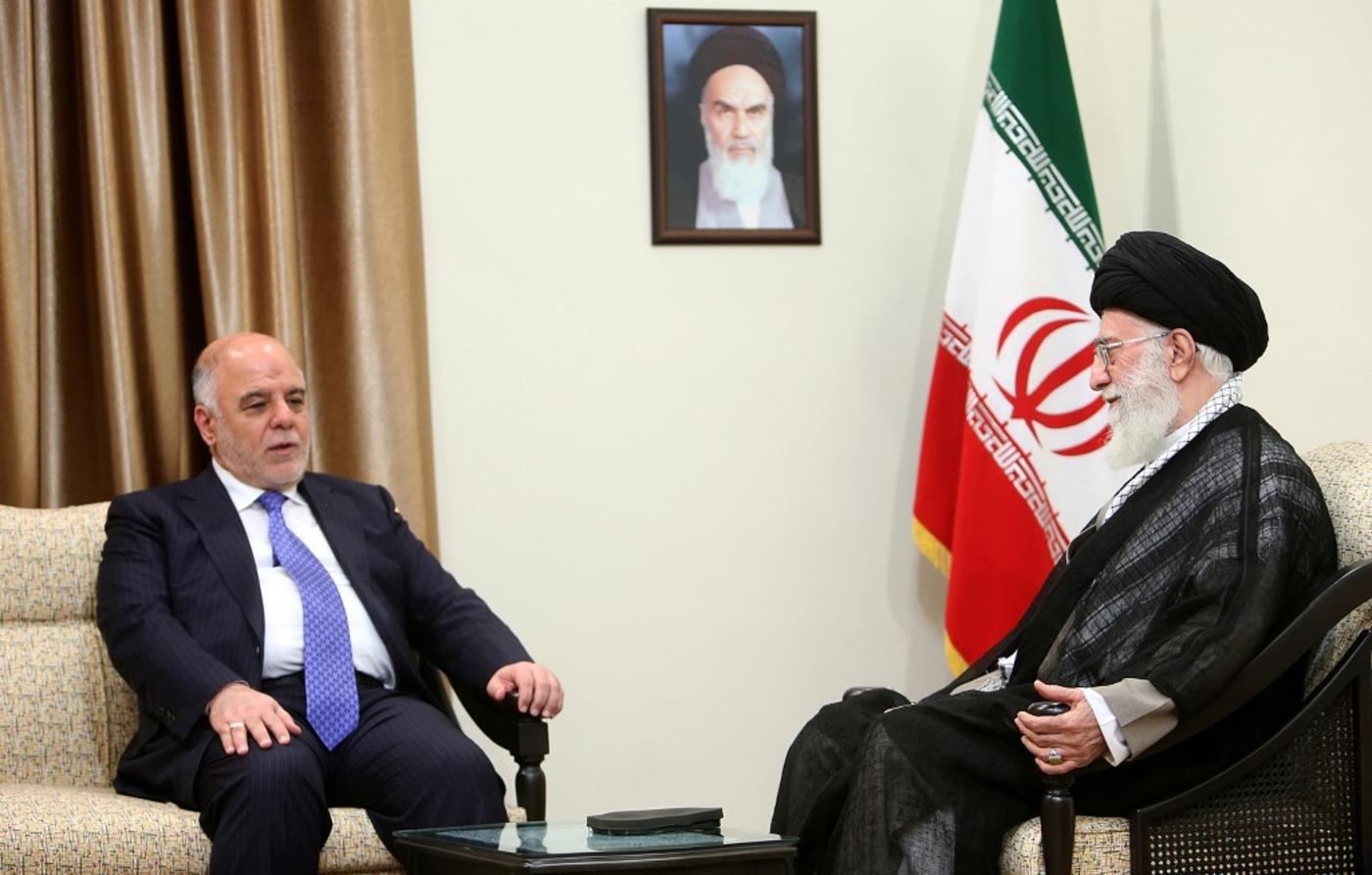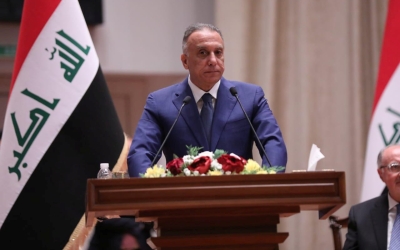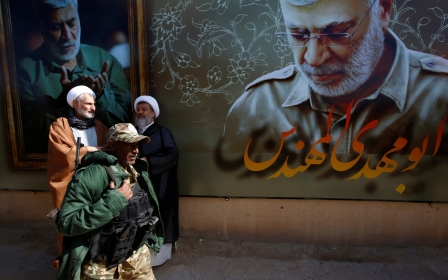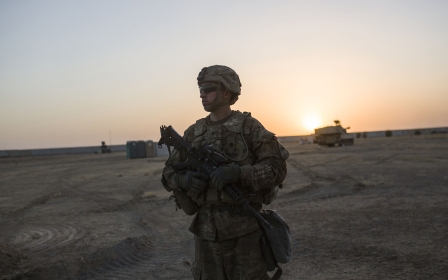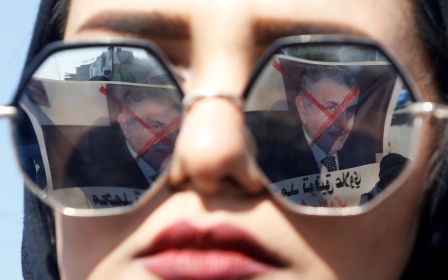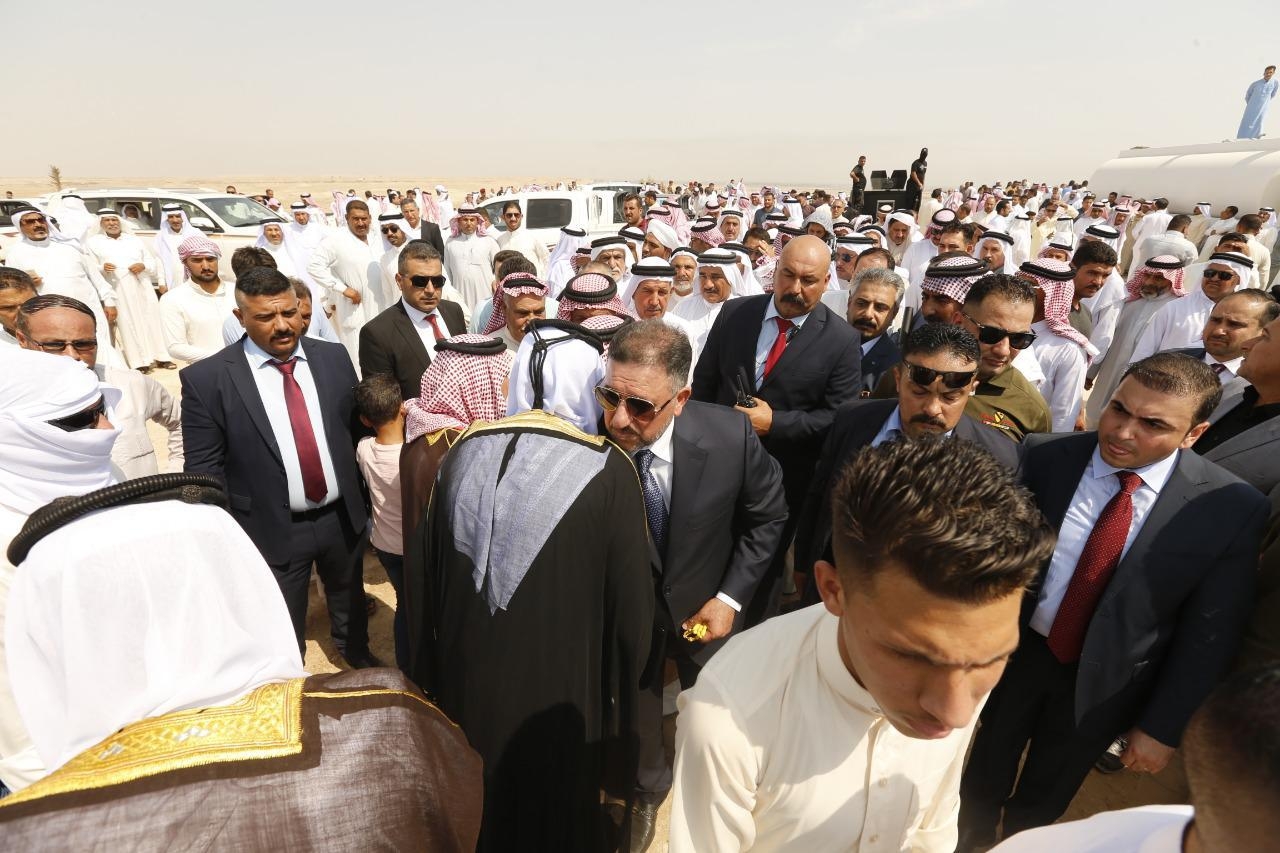
'Go to Tehran': The inside story of how the US was sidelined in Iraq
Khamis al-Khanjar collapsed into his chair, tossed his head back and laughed. We were in his flat in Istanbul and I had just asked the Iraqi businessman and Sunni politician why he had been put on the US government's sanctions list along with three Iran-backed Shia militia leaders.
“It's political, one hundred percent,” said Khanjar of the December 2019 announcement by the US Treasury during his recent interview with Middle East Eye.
“In fact the Saudis were threatening me directly. They said to Adel [Abdul Mahdi, the then-Iraqi prime minister] they were going to put me on the sanctions list.”
Abdul Mahdi told them this would be “a huge mistake”, Khanjar added.
“But the Saudis do not understand. For them everything is about money. It's not about money. When the candidates they have bought up fail to win seats in parliament, they thought I'd paid people more than they did. They don’t see how stupid their approach was.”
New MEE newsletter: Jerusalem Dispatch
Sign up to get the latest insights and analysis on Israel-Palestine, alongside Turkey Unpacked and other MEE newsletters
Khanjar is referring to the 2018 Iraqi parliamentary elections in which he had sought to build a political bloc representing the interests of Sunni Iraqis who he said had been marginalised for years by Iraq's dominant Shia political leaders, and victimised and abused by the Shia militias they controlled.
According to him, Saudi Arabia was also trying to influence the election with the aim of keeping Haider al-Abadi, the US-favoured incumbent prime minister, in power. When the plan failed, the Saudis took their revenge.
The US Treasury notice accuses Khanjar of bribery and corruption among other unproven crimes, alleging that he “planned to spend millions of dollars in payments to Iraqi political figures in order to secure their support” and attributing those allegations to an unnamed “former senior Iraqi government official”.
It also describes him as a “businessman and millionaire who enjoys significant power on a regional and international level”.
On this at least, Washington officials can testify from experience for Khanjar is no stranger to the US embassy in Baghdad.
The pictures on his iPhone are a diplomatic history of the 17 years since the US-led invasion and the fall of Saddam Hussein in 2003, since when he has been privy to and involved in almost every backroom discussion about Iraq.
He knows and has known the key regional players personally: Saudi Crown Prince Mohammed bin Salman, Abu Dhabi Crown Prince Mohammed bin Zayed, the late Iranian General Qassem Soleimani, as well as western diplomats including Brett McGurk, an Iraq specialist and former US presidential envoy to the anti-Islamic State coalition, and John Jenkins, a former British ambassador in Baghdad. He has met all of them, regularly.
Diplomats beat a path to his door and for good reason. If you wanted to know what the Sunni tribal chiefs or Sunni leaders were thinking, you tapped Khanjar.
It was to Sunni leaders like Khanjar that the Americans turned when they sought to recruit and fund a Sunni militia army to lead the campaign known as the Sahwa, or awakening, against al-Qaeda at the height of the militant insurgency against US occupying forces in 2006.
Khanjar was also involved in the project to launch al-Iraqiya, Iraq's first non-sectarian party list, which was divisively denied the chance to form a government despite winning the most parliamentary seats in the country's 2010 elections.
And it was Khanjar that the CIA asked when they wanted to know why Sunni leaders in Iraq were turning away from American and Saudi influence and towards Iran.
This is Khanjar’s story of how he went from being a long-standing Iraqi interlocutor to the target of punitive US sanctions usually reserved for individuals accused of terrorism and atrocities in the space of a few months.
His account is a partial one. It is also disputed by those he talks of. But it is the first-hand testimony of someone who has been at the table in key meetings with successive Iraqi prime minsters.
His is not just a personal story. It is the story also of how America lost Iraq. To the CIA man, Khanjar replied: “You don’t know it, but I can tell you how America is losing support in Iraq.”
How liberators became occupiers
Khanjar makes no bones about it. He welcomed the US invasion in March 2003 and the swift fall of Saddam Hussein's decades-old dictatorship. He himself had fled Iraq six years earlier in 1997.
“Had I gone back in that time I would have been executed. What people forget now is that Iraqis were all equal under Saddam. If you were an opponent, you were an opponent forever. People were killed for anything,” Khanjar said.
'It was obvious the Americans were destroying Sunni communities. In Fallujah they used illegal weapons. Gradually al-Qaeda came into force'
- Khamis al-Khanjar
Most Iraqis had been slow to realise the dangers of the occupation, he said. When the Americans invaded, there was little resistance. US troops were relaxed. They walked the streets and went to restaurants. The majority of Iraqis believed the Americans were there to develop the economy and then leave.
But the honeymoon was brief.
It lasted until UN Resolution 1483, passed in May 2003, in which the Security Council formally recognised the US as an occupying power with administrative responsibilities. Then came the fateful decision of Paul Bremer, America’s first viceroy in post-invasion Iraq who was officially known as the Administrator of the Coalition Provisional Authority, to disband the Iraqi army.
Bremer created a ruling council on a sectarian basis, which he claimed was correcting a mistake made when Iraq was established in 1921 under British control following the collapse of Ottoman rule.
The coalition authority was the first time that Iraq had a government appointed on a sectarian basis. Each of these decisions were to sow the seeds of the civil war that followed.
According to Khanjar, these mistakes were exacerbated by the behaviour of US contractors, searching houses and harassing women, and he also points out the anger at the use of banned white phosphorus by US troops in an assault in 2005 on his home town of Fallujah, which had become a militant stronghold. All this led to more resistance.
“We know now there were contacts between the Americans and Iranians during that period about the new Iraq and how to administer it. Documents are now available about the cooperation between the two states,” Khanjar said.
“More than half of Baghdad was under the control of the resistance forces and al-Qaeda was not one of them. The resistance was in control of most of the Sunni-majority areas.
"The Americans started to attack region by region. After they gained control, they handed them over to the security forces dominated by Shia militias and these units behaved in a radically sectarian way. It was obvious the Americans were destroying Sunni communities. In Fallujah they used illegal weapons. Gradually al-Qaeda came into force,” he said.
In 2007, a meeting was arranged in Amman. Khanjar was among the Sunni representatives who met Shia leaders.
“The Shia asked us what we wanted to calm the situation down. We said to them: 'We want a just state in which all Iraqis are equal before the law'. We explained to them how the Sunnis were excluded from the security services and the ministries of defence and oil.”
Those on the Shia side (Khanjar is reluctant to name them) said: “We have a problem. We fear the remnants of Saddam’s regime and we are afraid of al-Qaeda elements. Unless you get rid of al-Qaeda we cannot give you your rights back although we know these are your rights.”
Betrayal of the Sahwa
Khanjar had supported the Sahwa, he said, because he saw it as a way of getting rid of al-Qaeda.
“They were attacking Sunnis and Shia, everyone. The policy of al-Qaeda was to attack the entire Shia community. Our problem was with the Shia politicians, not the ordinary citizen.”
The Americans agreed in return to pay and arm Sunni fighters and recruit 70,000 of them into the Iraqi army after al-Qaeda was defeated.
“What really happened is that this Iraqi army which was founded by Bremer, the Shia military, they started to behave badly in the Sunni-majority areas, attacking women, preventing people from going into the mosque, humiliating people at the checkpoints, sometimes even killing people because of their Sunni names.
“The Sunnis started to speak to us. They said: 'Okay we managed to remove an evil, but we brought a bigger evil.’”
Worse was to come. The American promise to absorb 70,000 fighters was never fulfilled. Instead they said that this decision could only be made by the sovereign Iraqi government, which was then headed by Nouri al-Maliki, Iraq's prime minister from 2006 to 2014.
“From the Sunni point of view, this was an American betrayal. The Americans stopped talking to us and they handed the file over to Maliki, at the time when Maliki started to show the worst of his sectarian sentiments.
“Maliki stopped paying the fighters - 80 per cent of them. Dozens of their leaders were killed. He arrested some, and others escaped outside Iraq.”
The Sunni Sahwa fighters found themselves squeezed. Both Sunni public opinion and the government of Maliki had turned against them.
In 2008, two years into Maliki’s first term as prime minister, a group of about a dozen Sahwa commanders met the US ambassador in Jordan, and told him bluntly: “You have betrayed us.”
The ambassador consulted with the State Department in Washington. He came back to them five days later. All they could offer was to settle five of them in the western US state of Nevada, which is what happened.
“It was obvious the Americans gave them the cold shoulder and Maliki was after them. Some of them went to the Iranian side to present themselves. They gave themselves into Iranian arms,” Khanjar revealed.
How al-Iraqiya was formed
Communication with the Americans went dead, but Khanjar and other Sunni leaders continued to talk to Shia political leaders, even though those who had helped to mobilise the Sahwa fighters were now being denounced as terrorists.
Khanjar kept insisting that the problem could not be solved by applying a security solution. They needed a political settlement. The idea developed to fight the next elections, then still 18 months away, with a pan-Iraqi nationalist list, headed by a Shia leader with non-sectarian credentials.
“We spoke to three groups, including the Maliki group. We brought all the Sunni forces to my house in Amman with the agreement of the Jordanian government.
“We met for about two days, and we decided to participate on a massive scale in the elections and through elections change the situation in Iraq.
“The idea behind it was, rather than let the Sunni youth go back to arms, to convince them that change in the country can be brought about through elections and give them hope.”
They needed a major figure to head the list. They approached Maliki, Iyad Allawi, who had served as Iraq's interim prime minister following the 2003 invasion from 2004-05, and Jawad al-Bulani, the country's then-popular interior minister.
'The Americans went crazy. They wanted Maliki to win at any cost, but we won'
- Khamis al-Khanjar
“Maliki called me by phone. He thanked me for the contact and he said he would meet after the election. The other two agreed. So basically Maliki was not interested about the national unity idea, but a few weeks later, there was disagreement between Bulani and him, and that is how the Iraqiya list came into existence. Allawi became the leader and the list was a breakthrough for including Sunni and Shia politicians.”
Al-Iraqiya won 91 seats; enough to make it the biggest group within the parliament. Maliki’s State of Law Coalition came second with 89 seats. The constitutional court ruled that governing coalitions could be formed after elections rather than before it, as was the political convention at the time. This allowed for nine months of manoeuvring and arm-twisting which allowed Maliki to stay in power as the incumbent prime minister.
Maliki was not only Washington's man, but Tehran's too. The two sides met frequently, Khanjar said.
“The Americans went crazy. They wanted Maliki to win at any cost, but we won.”
Eight months of political conflict followed. Syria, Qatar and Turkey were all involved in mediation attempts. But in the end, the US understanding with Iran prevailed to keep Maliki in power.
One further problem remained, however - Maliki was not Barack Obama’s man. Enter Brett McGurk, one of only three George W Bush-era political appointees to survive the transition to the Obama presidency. He was called back into service to resolve the political stalemate in Iraq.
McGurk led the US group which convinced Obama that the only solution in Iraq lay in a new deal with Iran, which meant bringing Maliki back for a second term.
The Americans began to exert pressure on the Sunni political groups to provide support for Maliki.
'Go to Iran', Sunnis told
“Maliki came back to power with a very profound sense of revenge,” said Khanjar.
“He wanted to destroy the Sunni leaders and Sunni areas who voted against him. He turned against Sunni leaders like Tareq al-Hashemi, the vice president, and Rafi al-Issawi, the minister of finance and deputy prime minister, who were popular and forced them to leave the country.”
Hashemi, who initially fled to Iraq's semi-autonomous Kurdish region and now lives in Turkey, was accused of orchestrating bomb attacks against Shia politicians. He was sentenced to death in absentia.
“And now the prisons in Iraq were full of hundreds of Sunnis, young people. Women were arrested without any charge, simply because their brother was suspected of being al-Qaeda. Rape was used,” Khanjar said.
Khanjar's account is consistent with concerns raised at the time by international rights watchdogs who accused security forces under Maliki's control of running secret prisons and torture.
By 2011 the security situation was unravelling fast. The wave of arrests sparked large demonstrations in Sunni-majority cities like Ramadi. When demonstrators clashed with security forces in Hawija, near Kirkuk, dozens of protesters were killed.
The Iraqiya party leaders were desperate. They appealed to the Americans and British for help. John Jenkins, then the UK's ambassador to Iraq, came to Khanjar’s house in Amman.
'Maliki was seeking to overturn the result... It was incomprehensible to me why no one in western capitals seemed to be doing anything to stop this'
- John Jenkins, former British ambassador to Iraq
The Sunnis gathered there asked Jenkins what they should do, as they believed they had won the elections.
His reply was blunt, according to Khanjar: ”Go to Iran, you don’t have any other choice.”
Approached for comment by MEE, Jenkins recalls the meeting with Khanjar. He disputes having told Khanjar to “go to Iran” but agrees that he was “anti-Maliki and anti-Iran”.
Jenkins said: “I am pretty sure I said no such thing. The context you describe is, of course, correct. My view at the time - and nothing has changed it since - was that the elections in March and all subsequent opinion polling showed that a plurality of Iraqis wanted a non-sectarian government under Iyad Allawi.
“We had seen the same signs in voting patterns during the provincial elections in early 2009. So it wasn’t a temporary thing. Al-Iraqiya had won the 2010 parliamentary elections in spite of numerous obstacles.
“Maliki was now seeking with Iranian help, the collusion of the chief justice, Midhat Mahmoud, and the apparent complaisance of the US to overturn this result in order to stay in power. This would only benefit Iran - and of course Maliki. It was incomprehensible to me why no one in western capitals seemed to be doing anything to stop this.
Jenkins remembers being accused at the time of being anti-Shia. “That was not true. I was certainly anti-Maliki and anti-Iran. This was not because of some essentialist belief in Iranian wickedness. It was strictly business: I thought Maliki was hostile to us ... and that the Iranian capture of Iraq would be a threat to British and broader western interests in the wider region. And it would seriously destabilise neighbouring states.”
While rejecting that he told Khanjar in all seriousness to “go to Iran”, Jenkins concedes that part of the discussion could have been about Allawi going to Iran.
“It is conceivable that part of the discussion was about whether Iran was open to an Allawi prime ministership. Iyad actually did go to Tehran once or twice. But given that Khamenei and Soleimani were adamant about the importance of a united Shia electoral bloc as the essential underpinning of an Iran-aligned, consociational and therefore sectarian Shia hegemony in Iraq, it was always a very long shot.”
According to Khanjar, another Sunni leader reached Obama in the White House. The reply was the same. The Americans washed their hands of responsibility for Maliki’s purge.
Khanjar appealed directly to Iraqi Shia leaders at a meeting in Brussels.
“We told them: 'You are pushing our people into terrorism. When the Sunnis resisted the occupation, you said they were terrorists. When the awakening group resisted al-Qaeda, you called them terrorists, and when Sunni politicians won the elections, you called them terrorists. How are we going to communicate?’”
For Sunni leaders it was obvious that both the US and Iran had the back of the Shia groups.
'Total war was launched'
The point of no return came when Maliki’s forces launched an operation in Anbar province in February 2014 against local Sunni tribal militias amid more anti-government protests. “Attacked” is the word Khanjar uses.
The Sunni tribal leaders called their men to arms to confront an Iraqi army force that was mostly made up of Shia militia units.
In the first clashes between the army and Sunni fighters, the nascent Islamic State of Iraq group, which was regrouping from the remnants of al-Qaeda in Iraq and was by then also operating in Syria, was not present. It only emerged in the vacuum created when the army ran away, Khanjar said.
“That opened a vacuum for the re-emergence of al-Qaeda which quickly evolved into Daesh [the Islamic State group]. They were more organised and this is how Daesh entered a Sunni-majority region which al-Qaeda had not really been in. From Anbar, they approached Baghdad. They entered Salaheddin province and even Shia leaders started to flee the country.”
'Total war was launched, a war that did not discriminate between Daesh and the local people'
- Khamis al-Khanjar
Khanjar despaired.
“Daesh were criminals. They regarded the tribal leaders as non-believers. They killed the Shia ulema. They regarded the Muslim Brotherhood, Iraqi nationalists all of them, as non-believers. Whoever disagreed with them, whoever took part in the political process, they were to be executed. A lot of Sunnis fled to Turkey and Jordan.”
The Sunni tribal groups decided, just as they had done against al-Qaeda, that they should turn their guns on the militants. The politics in Baghdad were propitious too, as Maliki had by now been replaced by Haidar el-Abadi.
“Abadi was a decent human being,” Khanjar recalled. “He started with reconciliatory measures. He stopped detentions and released a lot of people from prison but total war was launched, a war that did not discriminate between Daesh and the local people and led to the destruction of many Sunni cities.”
For the first time since the Sahwa, the Americans showed interest in the Sunnis. Khanjar was the head of a delegation that met McGurk, by then the US presidential envoy to the anti-IS coalition, and a representative of the Iraqi government in Abu Dhabi.
Among their main concerns were the Popular Mobilisation Units (PMUs), or Hashd al Shaabi, which had been set up with the Iraqi government's support after Iraqi Shia leader Ali al-Sistani had called for volunteers for the Iraqi security forces. The Shia militias used Sistani's call to form the PMUs to defend Iraq's cities from the IS threat.
This came after an agreement with Abadi to establish a National Guard throughout Iraq, which would have been the opportunity the Sunnis needed to take part in the protection of their provinces.
“[McGurk] said to us: 'We want you to take part in the war against Daesh. We will give you cash,'” recalled Khanjar.
“We reminded the US delegation of what happened to the awakening. We said that we were prepared to fight on one condition. The Peshmerga operated in the Kurdish areas and now these PMUs were operating in Shia areas. We told him that we wanted a national guard in the Sunni areas, formed from Sunni fighters and to be connected directly to the Prime Minister’s office.”
According to Khanjar, McGurk promised at an earlier meeting in Baghdad that the PMUs would not advance beyond Qarma to the west of Baghdad and Samara to the north. The deal was that the PMUs would not enter Sunni-majority areas. The meeting included Salman al-Jumaili, a former minister.
Khanjar said: "We proposed in this meeting a road map that included two parallel approaches, a political and a military one. That means not only dealing with Daesh militarily, but also dealing with the political and social reasons which led to the rise of Daesh in Iraq in the first place. McGurk was not interested. He was only interested in defeating Daesh militarily."
“Everybody knew that the PMUs could not advance 10 metres without American air cover. The Americans went back on the pledge they gave us and the PMUs advanced deep into Sunni areas both in the west and in the north,” Khanjar said.
MEE put Khanjar's account of the meeting to McGurk but he declined to comment.
But a former American official familiar with the discussions vehemently denied Khanjar’s account and said no assurances of any kind were ever made to him. He also said Khanjar had not provided a single soldier for training in the fight against IS even though he had frequently promised them.
This former official also claimed that Khanjar worked directly with Iranian-backed parties and routinely sought to bribe Iraqi politicians, leading to his designation by the United States last year.
MEE put this claim to Khanjar who replied: "This is false and fabricated. We were involved in political efforts to form a governing coalition after the 2018 election with the full knowledge and, at times, participation of McGurk himself. The irony is that we were forming the most moderate faction."
The Shia militias did not endear themselves in the provinces they liberated from IS, according to Khanjar. He accuses them of robbing and killing Sunnis at checkpoints and of stopping refugees attempting to return to their villages. He said Sunni areas were left “decimated” as a result.
Alleged atrocities by Iraqi government-backed forces have also been widely reported by human rights watchdogs.
The experience of the PMUs on the ground pushed Sunni leaders once again back into the political fray.
“We decided in 2017 that we should enter the election of 2018 with force, in agreement with our groups in order to stop the oppression exacted in areas controlled by the PMUs,” said Khanjar.
He returned to Baghdad for the first time in 20 years to orchestrate the campaign.
Saudis threaten Khanjar
At this point, he said, the Saudis stepped in. They read Iraq solely in terms of Riyadh’s rivalry with Turkey and Qatar and Mohammed bin Salman dispatched Tamir Sabhan, his right-hand man in the Gulf, to see Khanjar.
The meeting took place in Khanjar’s house in Amman.
Sabhan asked him “quietly” not to contest the elections in 2018. Sabhan had told him that “a few Sunni leaders should not enter the elections,” he recalled.
“I told him that we do not take permission from you and you are not a supporter of Iraq. Saudi Arabia left us for all these years to be killed. In our areas, people are oppressed, disenfranchised and refugees. What is your plan? What is your project?”
Khanjar said: “What I felt was that he did not give a shit. What he wanted was a position against the Muslim Brotherhood, Qatar and Turkey. When they lost hope in the US they started to recruit marginal Sunni figures, people who had no authority, just people who would be paid by them and listen to them.”
The Saudis' overarching aim, which was also shared by the US, was to keep Abadi in office.
Khanjar launched a Sunni bloc called the National Axis Coalition, with 50 MPs, a group equivalent in size to the Sadrists, the influential Shia nationalist bloc aligned with Moqtada al-Sadr. This gave them the balance of power and attracted US interest.
At that time Abadi shared the leadership of his bloc with Falih al Fayyad, the political leader and chairman of the PMUs and a former head and adviser to the National Security Council, but the two men were about to fall out over Abadi’s insistence that he should be the bloc’s only leader.
Before this happened, according to Khanjar. McGurk sought to pressure or persuade the Sunni bloc into supporting Abadi. Khanjar says that McGurk offered him incentives such as a personal meeting with Mohammed bin Salman.
“He tried to entice us, promising things for us to support Abadi. Once he said to me: 'We will go, me and you, in private meets and we will meet MBS and I will push the Saudis to open up with you.'”
"I replied: 'Mr Brett, I met MBS more than once. My concern is not that. I did not fight the election to become fodder for one of these emirs. We have problems in our areas.’”
Four demands
Khanjar laid down four demands: a prisoner release, and investigation into the disappeared; the PMUs to withdraw from Sunni-majority areas; Sunni participation in government security institutions; and the reconstruction of Sunni areas damaged by years of conflict.
“We will support whoever agrees to these demands. My problem is not with the Saudis. You listen to the Saudis and the result is total failure,” Khanjar told McGurk, according to his own account.
'Abadi was useless. He did not make commitments'
- Khamis al-Khanjar
Khanjar promised also however to open negotiations with Abadi, but he was not optimistic.
“My experience with Abadi was this: when he formed his government in 2013, he made a promise about forming a national guard and dissolving the PMUs. Even America backed the move. After he formed his government, he legalised the PMUs. This is the experience I had in mind when I was meeting him.”
Three meetings followed in which Khanjar presented the Sunni demands to Abadi, but the prime minister was vague on each.
“The guy was useless. He did not make commitments,” he said.
Nonetheless, Khanjar offered an alliance of blocs, because he knew he could deal with Falih al-Fayyad, then still allied with Abadi. They came from the same tribal backgrounds.
“I thought Fayyad was much easier to deal with. The point is sensitive because what the Americans are saying is that Iran brought me and Falih together. The truth is the tribal backgrounds we had in common, not Iran. Abadi refused my suggestion. I told him: 'Your bloc is going to break up.’”
Which is exactly what happened. Fayyad’s deputies split from Abadi. Parliament was divided. In one Shia camp there was Fayyad, Maliki and Hadi al-Amiri, the head of the Iran-backed paramilitary Badr Organisation.
In the other camp there was Abadi and Sadr. Each camp had about 100 MPs. This left the Sunnis and Kurds as power brokers.
Khanjar says he remains puzzled why the Americans and the Saudis favoured one Shia bloc over another. If the degree of influence exerted over them by Tehran was a factor then he points out individuals on all sides had their own links of varying degrees to Iran, and their own militias through which to wield influence on the ground.
“I asked McGurk, [which faction] will respond to our basic demands? Brett said: 'The PMUs'.
“I asked him, who will give me a commitment I can trust? He replied: 'The PMUs.’”
As far as Khanjar was concerned, this was a further indication that the Americans realised or had acquiesced to the fact that the power in Iraq lay with the Iranian-backed PMUs, the very force that was responsible for oppressing Sunni-majority areas.
The signal was clear: the Americans were abdicating responsibility for the fate of Sunni Iraq. “So he knows,” Khanjar describes himself thinking as he listened appalled to the advice that he said McGurk had offered.
This account of the conversation is also disputed by the former US official who has knowledge of these discussions.
Meanwhile, the Saudis were continuing to put Khanjar under pressure.
“Sabhan [the Saudi point man for the Gulf] started to make threats, saying that if Abadi was not coming back, we are going to stop support. You will get nothing. We are turning our back on you as Sunnis and Iraqis.”
But once again the Americans and Saudi had lost the power play. Abadi would win only 45 seats. Adel Abdul Mahdi became prime minister as a neutral figure supported by a majority of MPs and the meetings between Khanjar and McGurk ended.
Khanjar said this was also the “turning point” when he found himself under attack by the Saudis and their Emirati allies.
“At that point, it was obvious that the Saudis had lost everything in Iraq and that is how they started their media attack against every Sunni who participated in the formation of Adel Abdul Mahdi’s government. That is exactly the background of the problem between me, the Saudis and the Americans.”
Shortly afterwards Khanjar met a US delegation, including one person who reported to the CIA. They asked Khanjar why he had gone over to “the Iranian side”.
“I said to them sarcastically: 'We listen to them and we listen to you and we follow your example. For eight years under Obama, you were encouraging us to open up with Iran. President Trump, every day he is saying, 'This is not my war. If you want dialogue with Iran, you take it'. We have 1,500 kilometres of border with Iran. I am going to ask you a question.
“Listen, we did not have an election with Iran. We had an election with Iraqi political leaders who have got relations with Iran. Why do you deny us this right? You have meetings with everybody. You supported Maliki. You talk to Fallih al-Fayyad. Why do you do this and deny us the right to talk to people who are in this country?”
Support for Abdul Mahdi produced rapid results. In his year in office most of the checkpoints in Sunni-dominated areas were dismantled. More than 20 Shia militias operating in Sunni-majority areas were removed. Hundreds on death row had their sentences quashed and thousands of Sunni prisoners were released.
Abdul Mahdi resigned in November 2019 amid mass demonstrations after security forces used lethal force against protesters. It took the Iraqi parliament until last month to agree to the appointment of former intelligence chief Mustafa Al-Kadhimi as his successor.
But neither the US nor Saudi forgives or forgets. Khanjar was blacklisted last December. Saudi decided: “It's us or them.” And “them” now includes the likes of Iraqi politicians such as Khamis al-Khanjar.
This article is available in French on Middle East Eye French edition.
Middle East Eye delivers independent and unrivalled coverage and analysis of the Middle East, North Africa and beyond. To learn more about republishing this content and the associated fees, please fill out this form. More about MEE can be found here.


